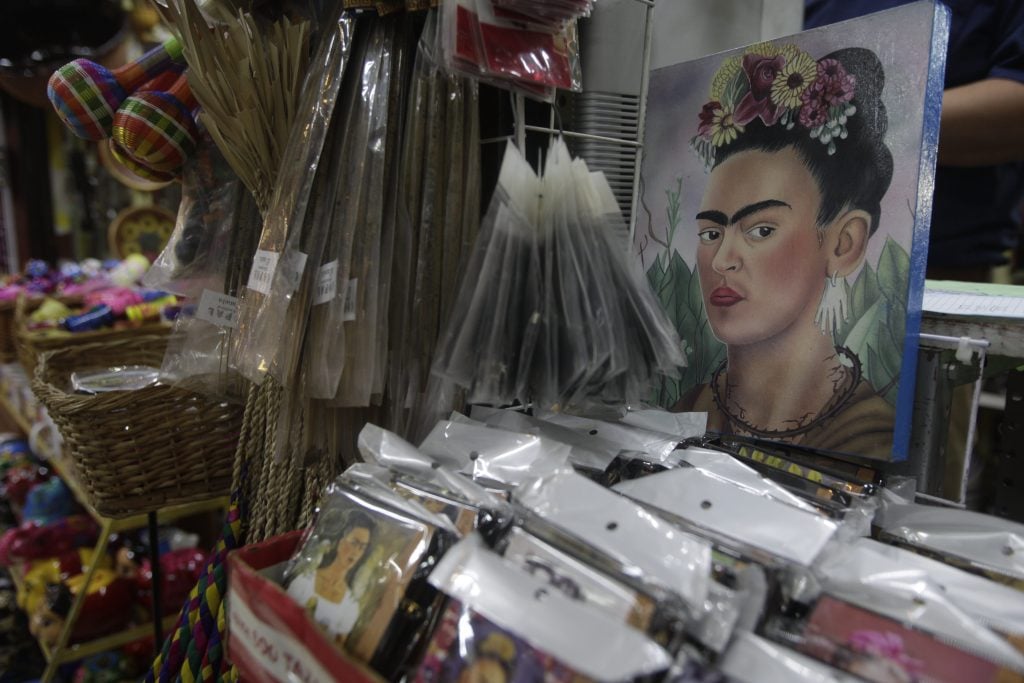Law & Politics
Frida Kahlo Corporation Files Lawsuit for Trademark Violations
The company has demanded all associated profits or $2 million for each trademark infringement.

The company has demanded all associated profits or $2 million for each trademark infringement.

Jo Lawson-Tancred

The Frida Kahlo Corporation (FKC) is a taking a renewed stand against the unauthorized commodification of the artist’s image. On Monday, March 4, the company filed two lawsuits at an Illinois district court claiming that a group of online sellers have counterfeited its trademarks to sell Frida Kahlo products.
In damages, the FKC has demanded all associated profits or $2 million for each trademark infringement.
The company claims in its lawsuit that a network of online merchants operated under “fictitious names” to sell items on Amazon and other platforms, sourcing product from a “common source” while working together to evade legal scrutiny. Their apparently independent stores share “unique identifiers,” the FKC claimed, suggesting that the sellers are “an interrelated group of counterfeiters working in active concert.”
The filing further claims that these actors “communicate with each other and regularly participate in chat rooms and online forums regarding tactics for operating multiple accounts, evading detection, pending litigation, and potential new lawsuits.”
The FKC did not respond to a request for comment.
The company was founded in 2004 by Kahlo’s niece and heir Isolda Pinedo Kahlo, Isolda’s daughter Maria Cristina Romeo Pinedo, and Carlos Dorado, a Venezuelan businessman, with the goal of commercializing and licensing the “Frida Kahlo brand.” It has trademarked several aspects of the artist’s identity, including her name and likeness, in an ongoing battle to maintain control of the iconic Mexican artist’s image.
Yet Kahlo’s own artistic and political legacy as a fierce anti-capitalist has often complicated FKC’s commercial pursuits, as noted by Dave Byrnes in Courthouse News, which first reported the latest lawsuit. In 2019, a folk artist named Cristine Melo filed a federal lawsuit against the FKC in California, hoping to stem the company’s attempts to keep her from selling her Kahlo-inspired paintings online.
Melo accused Dorado of using his business acumen to “con” the Kahlo family into giving him control of Frida Kahlo’s legacy, and argued Frida Kahlo herself was “known to favor and support the artwork and craft of local artisans” as part of her staunch political beliefs.
Another folk artist, Nina Shope, filed a similar federal complaint in Colorado, hoping to protect her handmade Frida Kahlo dolls from the corporation, which was backing the release of a Frida Kahlo Barbie doll made in partnership with Mattel.
Both Melo and Shope voluntarily dismissed their lawsuits after reaching settlements with FKC.
The Frida Kahlo Barbie itself was the subject of a legal tussle between the Kahlo family and the Frida Kahlo Corporation that saw filings in both Mexico and Florida courts claiming that Maria Cristina Romeo Pinedo tried to “sabatoge” the Mattel partnership. The Florida judge dismissed the suit, but Superior Court of Justice of Mexico City ruled in the FKC’s favor on the issue in 2021, allowing the Barbie to be sold in Mexico.